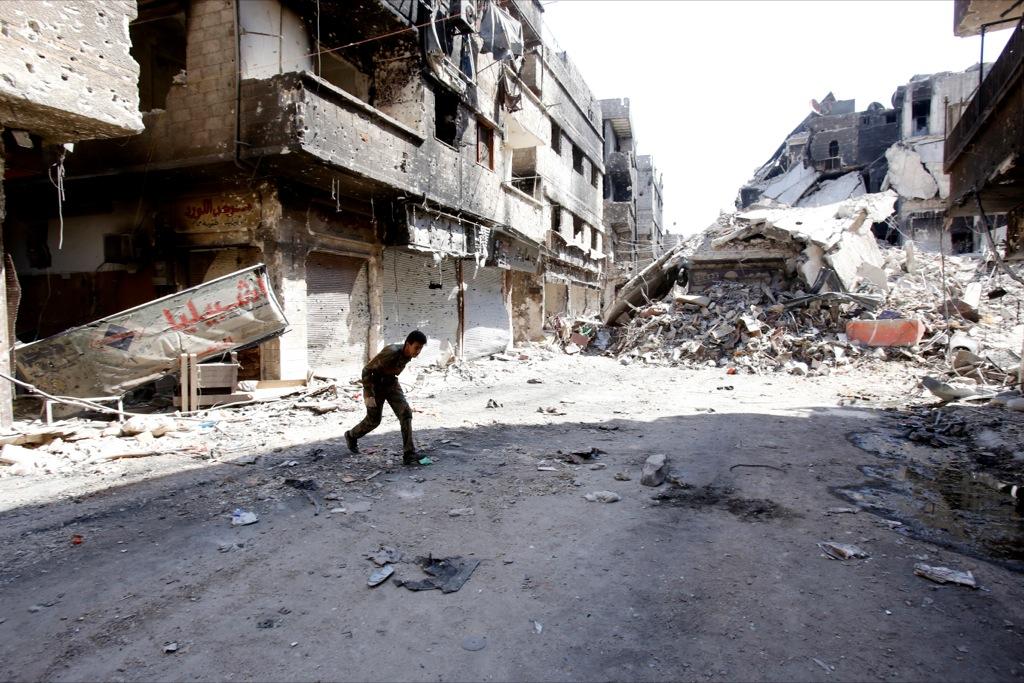Among many, another way forward to an end game in Syria
A fighter of the Popular Front for the Liberation of Palestine General Command (PFLP-GC) runs across a street in the Yarmouk refugee camp in the Syrian capital Damascus on Sept. 12, 2013, following fighting against rebel forces who control 75 percent of the camp. The PFLP-GC has been allied with Syrian President Bashar al-Assad’s government.
WINSTON-SALEM, N.C. — President Barack Obama decided to give diplomacy a chance, to see if the Russian initiative can place Syria’s chemical weapons and materials under international control.
He asked Congress to delay any vote to authorize airstrikes if these efforts fail. Congress was hesitant to give the president approval for military intervention for many good reasons; aside from current conditions on the ground, the benefits were dubious and the risks were significant. There was no clear end game in sight, one that would stop most killing and the immense threat to regional stability posed by the ongoing civil war.
The Obama administration had stressed three main benefits of airstrikes besides the moral imperative to act.
First, that the airstrikes were necessary in the face of the Aug. 21 chemical attack in order to deter other rogue leaders, especially the mullahs in Tehran, from developing nuclear weapons.
But this rationale ignored the fact that Iranian leaders probably want a nuclear tool, like North Korea, to deter American military intervention. US airstrikes on Syria would only exacerbate Tehran’s security concerns.
Second, American airstrikes were seen as important for the security of Israel and other regional allies like Turkey and Jordan. The strikes would have deterred and degraded the Assad regime’s willingness and capability to launch further chemical attacks.
Of course, the key risk here is that in every war the enemy has a vote. A retaliatory strike by Syria or Hezbollah on Israel is a distinct possibility, especially on top of Israeli strikes on Syria over the past several months. Simply put, American airstrikes could lead to a dangerous regional war, undermining Israeli security.
Third, it was argued that American credibility was on the line without airstrikes, given US treaty commitments and President Obama’s 2012 “red line” comment.
While one can agree that the United States should act, given the horrendous crime against humanity that took place on Aug. 21, airstrikes as proposed by either President Obama or Senator John McCain are not advisable until coordination with Syrian rebel units has been achieved. Otherwise, as foreign intervention degrades Assad’s military, the civil war would evolve into ever worsening sectarian chaos, to Al Qaeda’s advantage.
With the current pause announced by President Obama, there's an opportunity to take another approach.
The United States should launch an integrated diplomatic and military strategy with the potential to punish those in the Assad regime most responsible for the massive chemical attack. This should be a precondition for achieving the ultimate objective, an end to the civil war.
This approach would involve a five-step plan of action:
First, give diplomacy time to work or fail. The objective would be to put as many chemical weapons sites under international control as possible, especially in areas of the country outside of President Assad’s Alawite strongholds along the coast.
Second, continue to rapidly train Syrian nationals as CIA operatives, following the first 50-man team deployed recently.
Third, continue supplying heavy weapons to the relatively moderate Free Syrian Army (FSA) in southern areas near Jordan and Damascus.
Fourth, this force eventually should launch an offensive backed with American intelligence providing covert activity and possible airstrikes.
Fifth, once the offensive is underway, press the UN Security Council to approve an investigation of the Assad regime at the International Criminal Court (ICC).
The objective of this allied offensive should be clearly stated and rigorously followed.
The FSA would stay focused on the liberation of Damascus, leaving Alawite strongholds along the Mediterranean untouched.
The ultimate goal would be a negotiated settlement between the FSA and remnants of the old regime, one that respects all religious faiths and sects.
Bashar al-Assad, his family and top leaders associated with the chemical attack of Aug. 21 would be required to go into exile, giving them the option to avoid face-to-face prosecution at the ICC. The allies should make a public commitment not to target them for capture or killing, as long as chemical weapons are not used again.
Such a plan may take many months to succeed and carries its own set of risks. But without bold action, the killing and refugee problem will continue at an unacceptable pace, further endangering regional stability, perhaps to a breaking point.
In other words, the risks of inaction are far greater than the risks associated with a plan that could end the civil war and hold accountable those most responsible for the chemical attacks.
Charles R. Kennedy Jr. is an associate professor of management at the Wake Forest School of Business in Winston-Salem, N.C. He is the author of numerous case studies and articles on political risk in the Middle East.
Every day, reporters and producers at The World are hard at work bringing you human-centered news from across the globe. But we can’t do it without you. We need your support to ensure we can continue this work for another year.
Make a gift today, and you’ll help us unlock a matching gift of $67,000!
